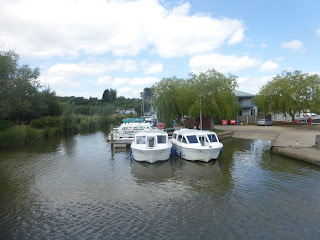I've just returned from my first proper visit to Suffolk - a county I've only passed through briefly in the past, en route to somewhere else. What a lovely place I've missed... Suffolk was beloved of Ruth Rendell and P.D. James, and features in some of their books, as well as in plenty of other good crime novels. Rendell even published a glossy illustrated guide to the county. Suffice to say that when I was invited to take part in the Slaughter in Southwold Crime Fiction Festival, I accepted very quickly indeed.
And what a successful festival it was - a huge credit to Charlotte Clark and her willing team, and to Suffolk Libraries, for whom Charlotte works as an executive library manager. She told me that the festival originally began in conjunction with the CWA, a great example of collaboration. Everything was very well-organised, and I bumped into old friends such as Val McDermid, Kate Ellis, Felix Francis, and Mick Herron, as well as having the pleasure of meeting Nicci French (that is, the husband and wife team of Nicci Gerrard and Sean French) for the first time. The attendance was excellent and Beccles Books also did a grand job of selling Gallows Court among other titles.
Southwold is a very long way from where I live - roughly a 500 mile return trip that involves some of the most depressingly clogged motorway routes in Europe, so I was determined to make the most of my trip. Suffolk boasts some delightful market towns, several of them with second hand bookshops, and on the way down I stopped off at Bungay, and wandered round the old castle ruins (above) as well as just about resisting the temptation to add to my book collection.
I really enjoyed my first visit to Southwold, a very upmarket little resort, with an inland lighthouse and pretty little beach huts - you can buy one too, if you have £75,000 to spare! I travelled to the equally smart Aldeburgh (above photos of Moot Hall, Martello Tower and marina), just down the coast. Both towns are home to lovely, high calibre independent bookshops which I enjoyed visiting very much. I also made a point of going to Dunwich (above photos of boat on beach and priory gateway), site of a once great port, now lost to the waves; a ruined priory still remains inland. The notion of a lost village, let alone a lost port, has always fascinated me. There was also a chance to take a look at Leiston Abbey (above, lower photos), a very impressive ruin.
Making my way up the coast, I spent one night at a hotel on the edge of Oulton Broad - I hadn't realised that the Norfolk Broads actually extend into Suffolk. As I was very lucky with the weather, I couldn't resist the lure of a boat trip along the broad, Oulton Dyke, and the River Waveney - a truly delightful experience. I also continued to explore the towns and villages of the area - the likes of Thorpeness (rather close to the nuclear reactor at Sizewell, but very attractive), Burgh St Peter, and Beccles, where I finally succumbed to temptation, having managed to find a couple of inscribed crime novels at yet another second hand bookshop.
And then it was on to Sutton Hoo, legendary as the site of Anglo-Saxon burials, and pleasantly situated above the River Deben. After that, on to Bury St Edmunds, a cathedral city as charming as Wells which I visited the other week, and dinner with Kate and her husband Roger, who were also doing the tourist thing, having had a similarly long journey.






































